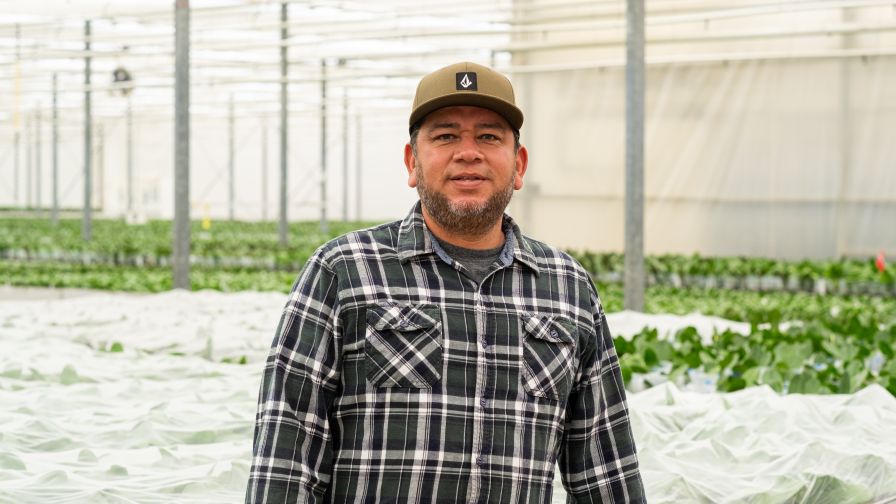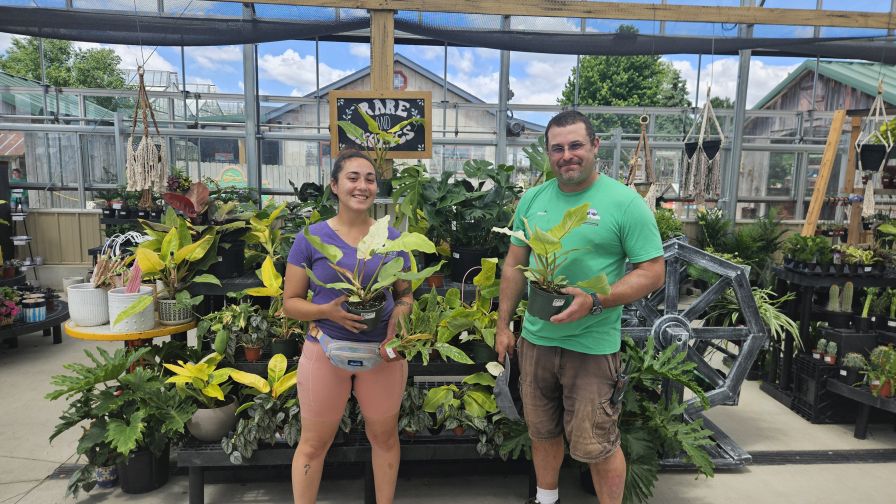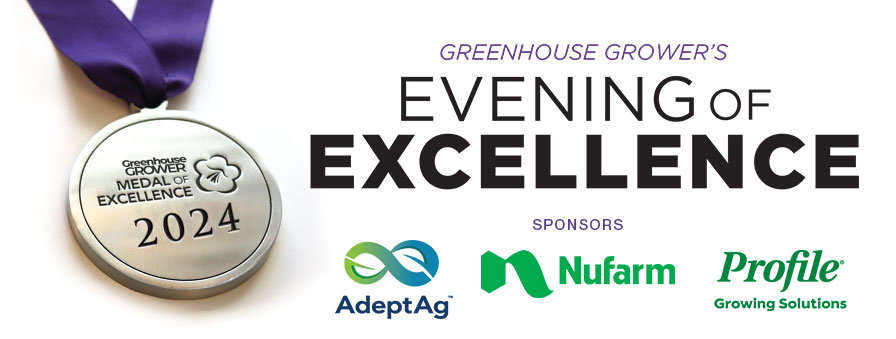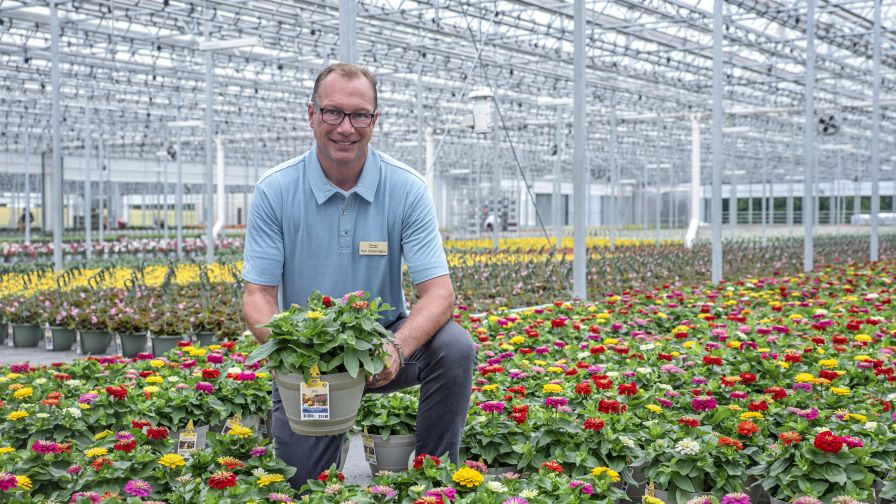Presenting Greenhouse Grower’s 2024 Head Grower of the Year Finalists
Tom Costamagna, Young’s Plant Farm
Costamagna has been Director of Horticulture at Young’s Plant Farm in Auburn, AL, since 2020, but he has previous experience with Mid-American Growers, Dümmen Orange, and American Color. He has the ability to communicate clearly and confidently with the growing staff working under him as well as with other high-level individuals, be they individuals at other businesses at his level or with Ph.D. scientists.
Tom is innovative in his thinking and by sharing his experience. He was one of the first growers who started applying auxins to cuttings by overhead spraying rather than by dipping the cutting base in the KIBA solution. While dipping cutting bases in KIBA promotes rooting, this is an extra motion that almost doubles the time needed to stick a cutting. Overhead spray application, especially using a boom, greatly reduces the time needed to promote rooting of cuttings by use of an auxin. Tom investigated this protocol back in 2013, and now foliar applications are common in floriculture propagation, saving untold hours in the sticking of cuttings.
“The most basic and fundamental actionable items related to growing are completing the tasks needed to be done, consistently, and on time. When executed correctly and consistently, the results are reliable, high-quality plants,” Costamagna says. “At Young’s Plant Farm we achieve this by making prescribed applications based by species, and application timing based on stage of plant development. We also recognize that plant quality is a result of watering properly which we execute based on stage of plant development, climatic conditions, and intended substrate moisture content. Whether done by irrigation boom, sprinklers, or hand watering this vital task is executed to deliver a precise amount of moisture in accordance with our standard operating procedures.”
Best part of his day: “The most exciting part of my day is participating in the executive plan, beginning with forecasting, scheduling, acquiring the various hard and live goods, implementing the many production activities required to produce plants including their growth, shipment, replenishment, and merchandising. It’s remarkable considering that we produce living organisms which rely on us manipulating Mother Nature to deliver our plants to the retailers. The best part of producing plants is knowing they will be purchased and placed in the home or garden to provide a diversity of color, form, texture, sights, and smells.”

Elias Torres, Westerlay Orchids
Elias Torres actively seeks opportunities to enhance Westerlay Orchids’ cultivation methods. He consistently explores and tests new substrates, growing pots, and growing technologies. By staying open to experimentation and innovation, he strives to identify and implement more efficient and effective ways of growing orchids. This approach reflects a commitment to staying up to date with the latest advancements.
Torres has actively implemented integrated pest management (IPM) techniques into Westerlay’s production practices, demonstrating a commitment to sustainable and environmentally friendly pest control measures. Through the establishment of a scouting program, the introduction of beneficial insects, and the use of a net covering, he demonstrates a proactive and holistic approach to pest management.
Torres prioritizes open and transparent communication with his team. He actively listens to his team members’ ideas, concerns, and suggestions, creating a safe space for dialogue. This approach not only motivates the team, but also encourages them to contribute their unique perspectives and actively participate in problem-solving and the decision-making processes.
Elias actively contributes ideas to improve various aspects of the operation. Whether it’s suggesting new cultivation techniques, process improvements, or innovative approaches, he demonstrates a proactive mindset focused on finding better ways of doing things.
“We are always looking to improve the way we grow our orchids, testing new substrates, growing pots, and different growing technology. In one of our facilities, we are able to collect our drain water and reuse it, reducing our water and fertilizer use,” Torres says. “A big help has been to better control climate in the greenhouse with energy screeners, dehumidifiers, and grow lights. Dehumidifiers are expected to reduce our natural gas consumption by 20% next year, which is a massive savings.”
Best part of his day: “Walking in the greenhouse, chatting with my team, and checking on the plants. When doing all of these, I always try to see the big picture. I like to contribute with ideas on future planning, variety selection, cost control etc. I like to help other departments with any questions they may have and am always looking at how we can improve the way we do things to get better quality and be more efficient at our work.”

Jason Wenninger, Ebert’s Greenhouse Village
While Ebert’s Greenhouse Village may not be the largest grower, Jason is sought after by national manufacturers to trial, experiment, and give feedback on new technologies because they know he will perform a solid grower trial using real-world techniques and document the results with photos, lab results etc. Better yet, he is willing to share his findings with the industry as a whole. Jason is a leader in trying new things, seeking out better technologies and methods, and is looked to by his peers as a leader in his region.
Jason leads by example and makes himself available as a technical expert to smaller growers and educational greenhouses who often don’t have access to sales reps and technical consultants due to their small size. He shares growing information freely with other growers, whether they’re seasoned growers or just starting out on their horticultural careers.
Jason has successfully transformed Ebert’s IPM program from one based on chemical pesticide active ingredients and a reactionary approach to insect and disease management to one based on an Integrated Plant Health (IPH) approach. He’s done this by testing and trialing emerging plant health products, including bio-insecticides, bio-fungicides, silicon-containing adjuvants, optimizing combinations and rates to build more resilient and healthier plants.
Jason leads from the front. He does not ask anyone to do anything he is not doing himself. He is always mindful to bring his team up to speed with what they are doing and why they are doing it so that everyone knows what is happening and what the ultimate goals are. Jason works to develop and improve his team so they are all better and more knowledgeable.
“I am always on the lookout to improve plant health. I am convinced if the growers have what they need, the plants have what they need,” Wenninger says. “If the plants have what they need, then the business has what it needs. When the business has what it needs, everyone benefits that is employed at that business.”
Best part of his day: “I enjoy sharing my successes and my failures. I have seen my trials not only help Ebert’s but everyone else in the industry. I love researching! I love improving myself, my growers, and giving back to an industry that has welcomed me.”













